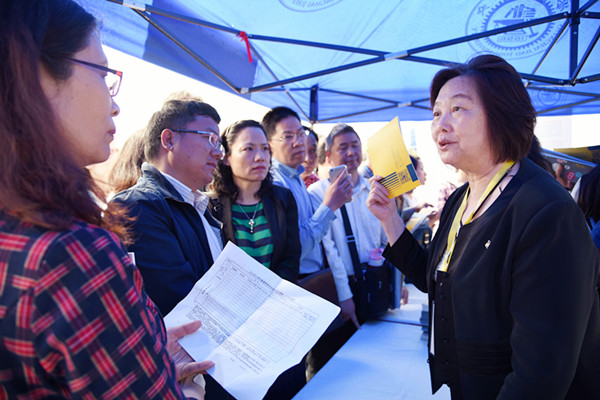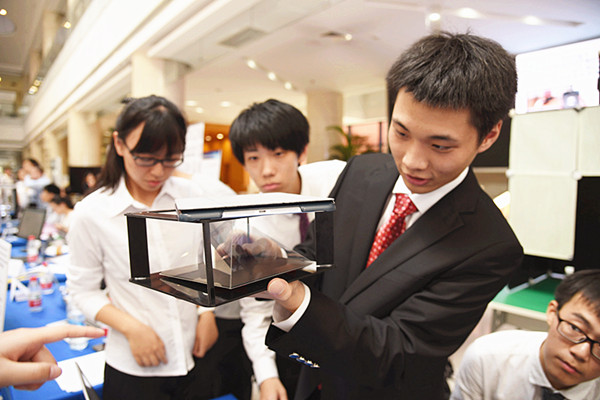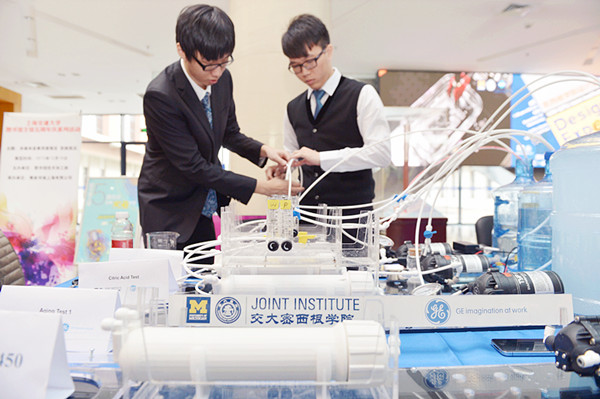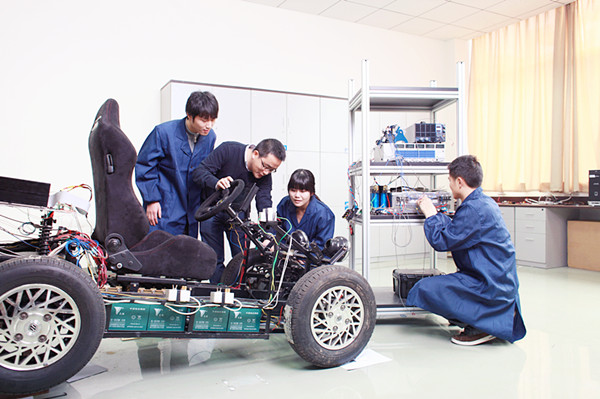The 2016 Shanghai Jiao Tong University (SJTU) Undergraduate Recruitment Fair cum Open House was held at SJTU’s Minhang Campus on May 7. More than 30 Chinese universities as well as all SJTU’s schools and departments set up booths at the new gym. The University of Michigan- SJTU Joint Institute (UM-SJTU JI) also deployed a large recruiting team to inform prospective students and parents.
 Yang Wang, JI’s recruiting director explaining JI’s new admission policy
Yang Wang, JI’s recruiting director explaining JI’s new admission policy
As usual, JI’s international training model attracted a large crowd. This time, the interdisciplinary training, JI’s new mission, also caught attention. Interdisciplinary is the source of innovative ideas, the foundation of cultivating innovative talents and an important way to improve our students’ international competitiveness. In the recent years, JI has been actively expanding interdisciplinary training. Last year, JI and the University of Michigan Ross School of Business successfully implemented an accelerated degree program, which combines engineering, technology and operations management. The goal is to nurture a mufti-talented generation proficient in both engineering and management. JI is planning future major mixes such as ” engineering + engineering,” “engineering + science,” “engineering + business,” “engineering + economics,” “engineering + law” and other models. In terms of degree combinations, JI will develop a more diverse degree program, expanding the current sequential undergraduate/graduate study program to include double master program and sequential master/doctoral study program, all in an interdisciplinary setting.
 JI freshmen showcasing their projects at the Design Expo
JI freshmen showcasing their projects at the Design Expo
Unlike traditional departments, JI’s educational philosophy is project-based learning. Freshmen start with a general education and get exposed to engineering knowledge head-on through “Introduction to Engineering,” “Introduction to Computers” and other basic courses. Allowed to participate in fun projects, JI students get interested in engineering and develop creative thinking. In addition, by increasing the course proportion of humanities and social sciences, JI builds students’ interdisciplinary foundation and a platform for them to adapt to the needs of future multi-talents. Dual-degree students can choose from nearly 20 majors at the University of Michigan, including Arts and Sciences, on top of their majors at JI. In the future, JI will explore incorporating information technology, business and arts to the dual degree program.
 JI seniors demonstrating the GE-sponsored “Low-scaling Home RO System”
JI seniors demonstrating the GE-sponsored “Low-scaling Home RO System”
In order to create a 100% interdisciplinary experience, JI merges her two majors, i.e., mechanical engineering and electrical and computer engineering, into one capstone design course and requires seniors of different majors to team up and complete projects proposed by the industry. Students learn to apply engineering knowledge to practical projects in a multidisciplinary environment, gain innovative practice experience and improve their ability to solve practical problems.
 Professor Chengbin Ma and his research team
Professor Chengbin Ma and his research team
Based on the six majors of mechanics, mechanical engineering, electronic science and technology, information and communication engineering, control science and engineering, power engineering and thermal physics, JI’s graduate program strives to build nine interdisciplinary groups, including design and manufacturing, fluid mechanics, mechatronics, electromagnetism, optics and electron physics, solid state physics, integrated circuits and VLSI, dynamics and vibration, communication networks and control, solid mechanics, structure and materials. It is an interdisciplinary knowledge network founded on major disciplines and enriched by related disciplines. By providing innovative interdisciplinary curricula, JI further broadens students’ horizons and nurtures their innovative capabilities.
As a successful example of international education cooperation, the Joint Institute has been at the forefront of China’s higher education reform. Over the past decade, through fusing the Sino-US educational philosophy and characteristics, JI continues to make breakthroughs in academic structure, management system, curricula and talent training. JI has explored a shortcut to build a world-class institute in China and has shaped the famous JI model. In the future, JI will uphold her mission of “Internationalization, Interdisciplinarity, Innovation, Quality” to build a world-class teaching and research institute as a base for training global leaders.
 Yang Wang, JI’s recruiting director explaining JI’s new admission policy
Yang Wang, JI’s recruiting director explaining JI’s new admission policy JI freshmen showcasing their projects at the Design Expo
JI freshmen showcasing their projects at the Design Expo JI seniors demonstrating the GE-sponsored “Low-scaling Home RO System”
JI seniors demonstrating the GE-sponsored “Low-scaling Home RO System” Professor Chengbin Ma and his research team
Professor Chengbin Ma and his research team




